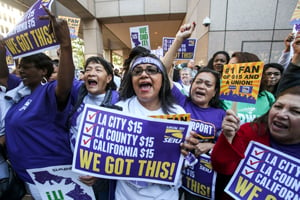The new year will ring in a new set of wage and hour laws and regulations that are bound to create bookkeeping and compliance headaches for many companies.
For L.A.-area employers, tracking the minimum wage will once again be the dominant concern among the raft of laws taking effect Jan. 1.
That’s when the statewide minimum wage will rise to $10.50 an hour – the same rate employers in the city of Los Angeles and unincorporated Los Angeles County are already paying. The increase is the first tangible result of a bill Gov. Jerry Brown signed into law earlier this year.
But if local employers think all they have to do in the coming year is comply with a single increase, they could find themselves in trouble. In several cities – Los Angeles, Santa Monica, Pasadena, and West Hollywood – as well as unincorporated areas of the county, the minimum wage will rise to $12 an hour for businesses with more than 25 employees, starting July 1. Businesses with 25 employees or fewer will still be paying the statewide minimum of $10.50.
Businesses with multiple locations in the county could find this patchwork challenging, said Erika Frank, vice president of legal affairs for the California Chamber of Commerce, or CalChamber.
“With all the new laws passed this year, what seems to be the most complicated issue for employers is keeping track of the new state minimum wage as well as local minimum wages and ensuring employees are being paid properly,” Frank said.
Businesses will have to get used to it. Minimum-wage increases will be hitting some employers in the county every year until 2022.
Payroll headaches
The moving target that is the minimum wage is but one payroll issue that will kick in Jan. 1. AB 2899 will require employers who challenge a state Labor Commissioner’s Office ruling that they have violated wage and hour laws to post a bond equal to the amount in dispute. Another law, SB 1342, will give local elected and appointed officials more authority to issue subpoenas to employers suspected of wage and hour violations and then turn over any information about employer noncompliance to Superior Court judges.
Yet another law, SB 1063, will prohibit an employer from paying any employees wage rates that are less than those paid to employees of another race or ethnicity for substantially similar work. This is a companion bill to a law passed last year requiring gender equity in pay.
Other laws
A pair of new laws will target the hiring process as well. AB 1843 will bar employers from inquiring into an applicant’s juvenile convictions or using such convictions as a factor in hiring. AB 1289 will require transportation network companies such as Uber and Lyft to conduct local and national criminal background checks for each driver and prohibit the use of drivers with certain types of convictions.
More new laws will target the prevailing wage – which is generally higher than the minimum wage – that employers who provide services or construction work on public works projects must pay to workers.
Among those are AB 326, which will require the release of funds held pending a prevailing wage determination, and SB 954, which will limit the ability for a nonunion contractor to receive a credit for certain payments made against the prevailing wage.
Some changes to the state’s workers’ compensation system also will take effect on Jan. 1. Among them are AB 2883, which will require workers’ comp carriers to include in policy coverage certain officers and directors of private corporations and working members of partnerships and limited liability companies. Many of these officers and members have traditionally been excluded from coverage provided by carriers; the concern is that including them will increase workers’ comp insurance premiums.
“AB 2883 is going to cause significant disruption for workers’ compensation insurers and employers,” state Insurance Commissioner Dave Jones said in a news release reminding them of the new law.
Transit Sponsorships
After complying with all of the new laws, perhaps you’ll be looking for a way to boost the profile of your business.
Companies can now apply for naming rights for rail lines, subway stations, and bus routes, thanks to a Dec. 1 vote by the Los Angeles County Metropolitan Transportation Authority board.
We might soon be able to look forward to names such as the Cornerstone OnDemand Expo Line.
Metro hopes to gain millions of dollars a year from selling these naming rights – money that would be used to operate the agency’s proliferating mass-transit systems.
Of course, the agency already takes in millions of dollars from advertisements on buses and bus shelters and benches. This program will seek longer-term corporate sponsorships, much like sports stadiums.
But not everyone need apply: The policy specifically excludes companies selling alcohol, tobacco and nicotine products, weapons manufacturers, adult entertainment companies, and religious organizations. That drew concern from some board members that the exclusions could be challenged on First Amendment grounds.
BizFed Additions
The Los Angeles County Business Federation, or BizFed, has named two political and policy veterans to its leadership roster.
Dan Schnur, director of the Jesse M. Unruh Institute of Politics at USC and a ubiquitous political commentator, has been named to chair the organization’s Southern California 2017 Task Force.
Lara Larramendi, a former Monrovia city councilwoman and mayor, has been named BizFed’s advocacy director.
“We are extremely excited to have two respected experts in Lara and Dan,” said BizFed Chairman Gilbert Ivey. “They will be invaluable to us and our members as we continue our work to improve the jobs creation climate in Southern California.”
The federation is an alliance of more than 160 local chambers of commerce and other business organizations that collectively represent more than 325,000 businesses that employ about 3 million people in the county.

